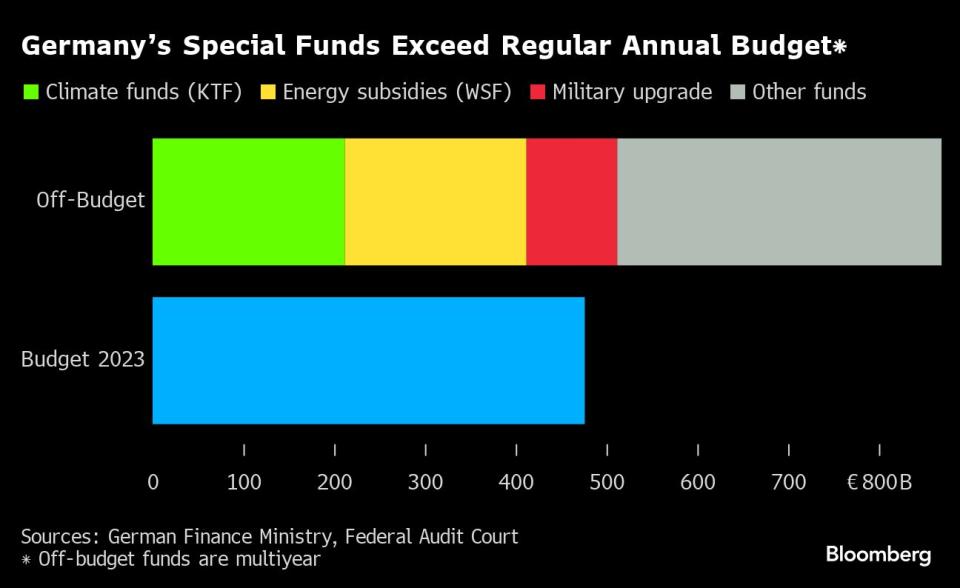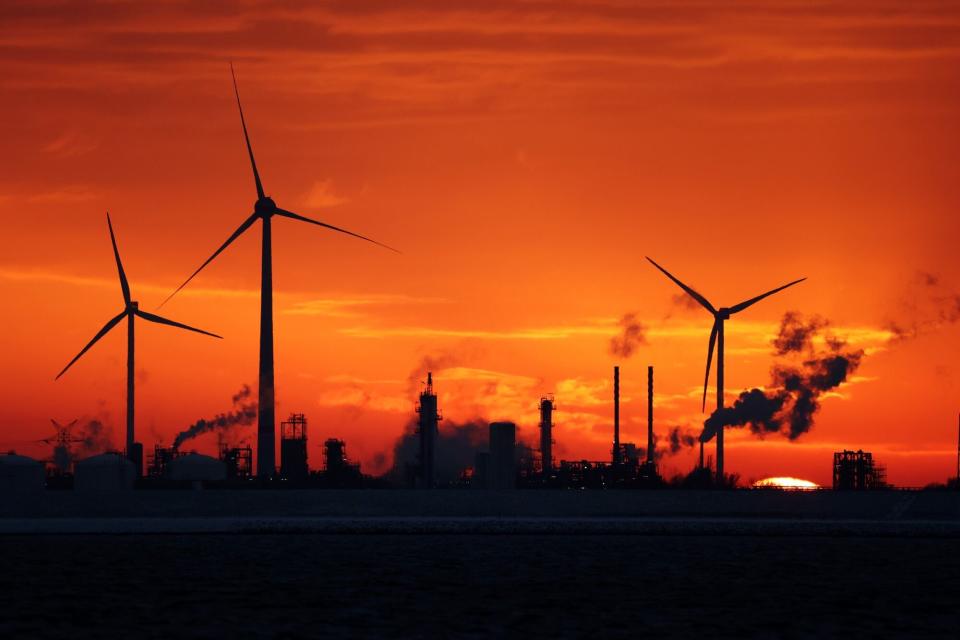German Economy Chief Promises Funding for Key Climate Projects
- Oops!Something went wrong.Please try again later.
(Bloomberg) -- German Economy Minister Robert Habeck pledged that the government will find a swift solution to the turmoil triggered by this month’s court ruling on off-budget funds and said it will secure the money for all projects essential for the transformation of Europe’s biggest economy.
Most Read from Bloomberg
Billions Wiped Out as Stock-Safety Trade on Wall Street Misfires
Singapore High Court Grants Injunction Against PM Lee’s Brother
Russia Downs Drones Over Moscow in Ukrainian Retaliatory Strike
Habeck, a member of the Greens who is also the vice chancellor, listed key initiatives the government remains committed to, including subsidies for expanding domestic semiconductor and battery production, greening buildings and local heating networks and building out solar energy capacity. He was speaking after talks in Berlin with counterparts from Germany’s 16 states, part of an attempt to bring together federal and regional officials from across the political divide to find a fix for the unprecedented budget upheaval.
“The key sentence is: All the projects we have conceived must be made possible,” Habeck told reporters, adding that abandoning any of the projects would both crimp economic growth and call into question Germany’s goal of reaching climate neutrality by 2045.
“We quickly need clarity for 2024 as many companies have already committed money,” Habeck added. He declined to provide details about funding specifics, saying he wanted to avoid any damaging public debate before final decisions are made.
The Nov. 15 ruling by the Federal Constitutional Court forced Chancellor Olaf Scholz’s governing coalition to suspend restrictions on net new borrowing for a fourth straight year in 2023 and pressure is mounting for it to do so again next year.
While the government isn’t planning to increase new federal borrowing, it has to shift tens of billions of euros of already authorized debt back into the regular budget from the special funds.
Habeck acknowledged that suspending the so-called debt brake next year is an option but said he wants to wait for officials to determine if that would potentially expose the government to additional legal challenges.
Finance Minister Christian Lindner, chairman of the fiscally hawkish Free Democrats, initially insisted on restoring the borrowing restrictions this year. Although he hasn’t explicitly ruled out lifting it again in 2024, he would struggle to convince his party base that it’s justified.
Kevin Kuehnert, general secretary of Scholz’s SPD, and Rolf Muetzenich, the leader of the party’s caucus in the Bundestag, have both called for the debt restrictions to be suspended again next year.
Muetzenich said triggering the emergency clause that allows additional new borrowing again is justified because Germany is still dealing with the fallout from Russia’s invasion of Ukraine.
The threat of the Israel-Hamas war developing into a regional conflict is another source of uncertainty, he said Sunday in an interview with public broadcaster ARD.
Kuehnert made a similar argument on Monday in an interview with RBB24 radio. External factors that trigger “enormous costs” and are not reasonably foreseeable in advance justify suspending the debt brake again in 2024, he said.
“Everyone involved in the debate must be honest and say that it is perfectly permissible to make use of the exception to the debt rule in an emergency situation,” he said. “Which we continue to have, because we have to make investments that can never be financed from the core budget.”
Lindner is expected to present a revised 2023 finance plan later on Monday for immediate approval by the cabinet. It will then be sent to parliament, with an initial debate scheduled for Friday morning.
--With assistance from Michael Nienaber.
Most Read from Bloomberg Businessweek
Scientists and Farmers Race to Save the World’s Banana Supply
Chinese Car Companies Cracked North America by Going to Mexico
MBA Alternative Augment Clinches $3.7 Million in New Funding
How Elon Musk Spent Three Years Falling Down a Red-Pilled Rabbit Hole
©2023 Bloomberg L.P.



